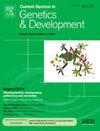Exploring the connection between RNA splicing and intellectual disability
IF 3.6
2区 生物学
Q2 CELL BIOLOGY
引用次数: 0
Abstract
Intellectual disability (ID) is a broad diagnostic category that encompasses individuals with impaired cognitive ability. While these disorders have heterogeneous causes, recent developments in next-generation sequencing (NGS) are revealing the prevalence of genetic etiologies. In particular, germline mutations in genes that affect RNA splicing are increasingly common causes of ID disorders. Research to elucidate the functional relationship between splicing and neurodevelopment is critical since molecular therapeutics require a nuanced understanding of the pathological mechanism. In this review, we first summarize the trends that have led to the discovery of the RNA splicing–ID relationship, then discuss recent progress and future directions for research surrounding RNA splicing in neurodevelopment. Finally, we speak on how these results may serve as the foundation for burgeoning therapies.
探索RNA剪接与智力缺陷之间的联系
智力残疾(ID)是一个广泛的诊断类别,包括认知能力受损的个体。虽然这些疾病有不同的病因,但新一代测序(NGS)的最新进展揭示了遗传病因的流行。特别是,影响RNA剪接的基因的种系突变日益成为ID疾病的常见原因。研究剪接和神经发育之间的功能关系是至关重要的,因为分子治疗需要对病理机制有细致入微的了解。在这篇综述中,我们首先总结了导致RNA剪接- id关系发现的趋势,然后讨论了RNA剪接在神经发育中的最新进展和未来的研究方向。最后,我们将讨论这些结果如何作为新兴疗法的基础。
本文章由计算机程序翻译,如有差异,请以英文原文为准。
求助全文
约1分钟内获得全文
求助全文
来源期刊
CiteScore
7.90
自引率
0.00%
发文量
102
审稿时长
1 months
期刊介绍:
Current Opinion in Genetics and Development aims to stimulate scientifically grounded, interdisciplinary, multi-scale debate and exchange of ideas. It contains polished, concise and timely reviews and opinions, with particular emphasis on those articles published in the past two years. In addition to describing recent trends, the authors are encouraged to give their subjective opinion of the topics discussed.
In Current Opinion in Genetics and Development we help the reader by providing in a systematic manner:
1. The views of experts on current advances in their field in a clear and readable form.
2. Evaluations of the most interesting papers, annotated by experts, from the great wealth of original publications.[...]
The subject of Genetics and Development is divided into six themed sections, each of which is reviewed once a year:
• Cancer Genomics
• Genome Architecture and Expression
• Molecular and genetic basis of disease
• Developmental mechanisms, patterning and evolution
• Cell reprogramming, regeneration and repair
• Genetics of Human Origin / Evolutionary genetics (alternate years)

 求助内容:
求助内容: 应助结果提醒方式:
应助结果提醒方式:


